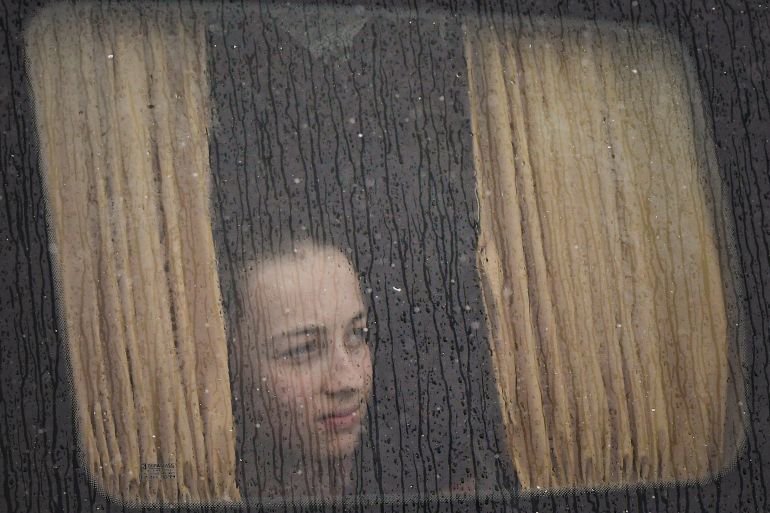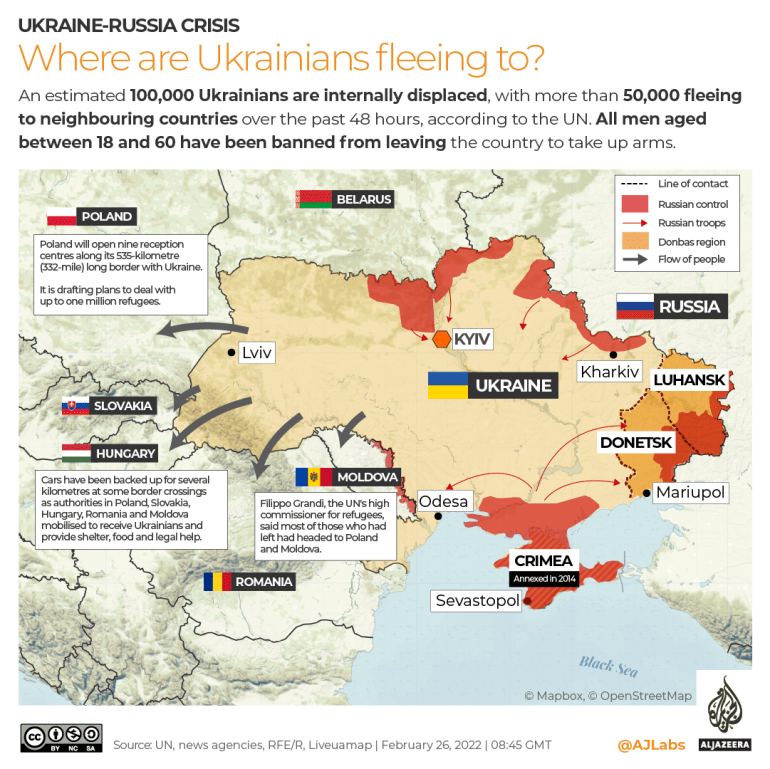In Northern Ireland, Ukrainian refugees find themselves in limbo
A Northern Irish politician tells Al Jazeera the UK’s visa system is ‘disastrous’ as thousands struggle to navigate complex requirements.

Belfast, Northern Ireland – Refugees fleeing the war in Ukraine have found themselves in limbo in Northern Ireland, caught between differing approaches to the crisis by the United Kingdom and the Republic of Ireland.
Ireland was the first country in the European Union to waive visa requirements for Ukrainians and, to date, nearly 30,000 have sought shelter there.
Keep reading
list of 3 itemsHow many Ukrainian refugees can Europe receive?
‘Only the dead feel no guilt’: Ukrainian refugees on surviving
The UK, which includes Northern Ireland, has instead opened sponsorship and family reunion schemes, which have been criticised for delays and complexity.
Unable to wait for visas, many refugees came to Northern Ireland via the open land border from the Republic – as many as four in five, according to Finance Minister Conor Murphy.
Officials say this makes it difficult to know who has arrived and when. Not having a visa can also present problems in terms of entitlement to public services.

‘Sheer frustration’
Sarah Henry, a solicitor at Granite Law in the Northern Irish border town of Newry, said her firm has been inundated with people in this situation since the war broke out.
As Northern Ireland is the only part of the UK that shares a land border with another country, she said, “what is happening here is completely unique”.
Some people crossed the border – which is unmarked except for signs switching from miles to kilometres – accidentally, aiming for Dundalk in the Republic, but ending up in Newry.
For others, Northern Ireland was their destination. But without visas for some or all of their family members, they were not able to access services such as healthcare.
One young woman and her child, who had a terminal illness, were not able to receive full medical support for weeks because they had no visa.
After initially failing to get a response from the UK Home Office, which handles immigration matters, the family was eventually granted temporary leave after five and half weeks.
Elderly Ukrainians who have family in Northern Ireland were waiting in unsuitable homes in the Republic while their visas were processed. Eventually, they also crossed the border “out of sheer frustration”, Henry said.
A common question clients ask is whether they should leave Northern Ireland and try and settle in the Republic.
Recent steps are helping to ease the sense of confusion, such as the opening of Ukrainian assistance centres, and offering of temporary six-month visas for those who cross the border.
But Henry said it is unclear how long these temporary visas will continue to be issued and, because the main sponsorship scheme does not allow in-country applications, what happens when they run out.
The issue of the border has been a source of tension since March, when a government source told The Daily Telegraph that Ireland’s open-door refugee policy for Ukrainians was a security risk to the UK.
A minister in the Irish government responded that they would be keeping the border open while focusing on information sharing between the two countries.
‘We just couldn’t wait for the visa, we couldn’t risk it’
Yuliya* has been waiting for a visa for her son Andriy* to join her in Northern Ireland for more than two months.
Andriy was visiting relatives in a safe area of Ukraine when the war broke out and, unable to reach him, Yuliya was forced to flee. Al Jazeera is protecting their identities as their case is ongoing.
After finding safety in Northern Ireland she applied for her son to join her, but eight weeks later a visa is still not issued.
“I called the hotline many, many times”, she said. “But they only said, ‘We can’t do anything.’”
With help from a local politician, Yuliya finally learned that the Home Office had not been processing her son’s visa, as they incorrectly assumed she did not have the required permit – despite being the office that issued it.
“First of all, it is Home Office which issued me this residence permit. So they must know that I have this visa,” she said. “And secondly, if they saw that something was wrong, why didn’t they contact us? And why didn’t they say anything when we contacted them so many times?”
As the situation in her country deteriorated, she managed to get her son to Ireland.
“It was getting really difficult to get him out. But we just couldn’t wait for the visa, we couldn’t risk it”.
While now only a short drive away, she wants to wait for the visa to be approved before Andriy travels to Northern Ireland, as she is worried she might jeopardise his situation.
“Ukrainians have been crossing the border without visas for months, largely unaware that they do so irregularly because of the government’s lack of clarity,” Stephen Farry MP, deputy leader of Northern Ireland’s Alliance party, told Al Jazeera.
“People were forced to seek safety irregularly because of the UK’s disastrous visa system,” he said.
Further adding anxiety, Home Office officials recently refused to rule out the possibility that Ukrainians who enter Northern Ireland via Dublin could be sent to Rwanda, as part of the UK’s wider controversial new immigration plans.
While a Home Office official told MPs a policy had been published in respect of those who cross into Northern Ireland without visas, the Home Office would not supply Al Jazeera with that document despite several requests.
“Ukrainians in Ireland wishing to come to the UK should apply to either of these schemes before seeking to travel, ”a Home Office spokesperson said, adding that they continue to work closely with Ireland on the management of their shared border.
Meanwhile, Northern Ireland is entering a new political crisis, as the Democratic Unionist Party has refused to enter government following a historic election for the rivals Sinn Féin, frustrating local efforts to support those who make it here.
“This does not bode well for our official response to the crisis facing refugees from Ukraine, despite the best efforts of civil servants and charities,” said Amnesty’s Northern Ireland director Patrick Corrigan.
*Names marked with an asterisk have been changed to protect identities.